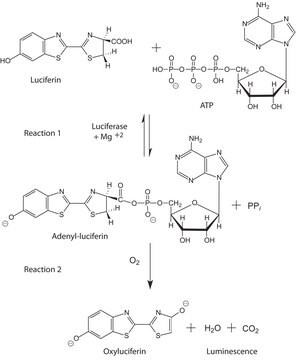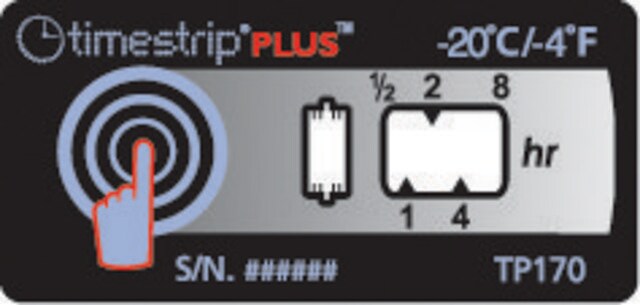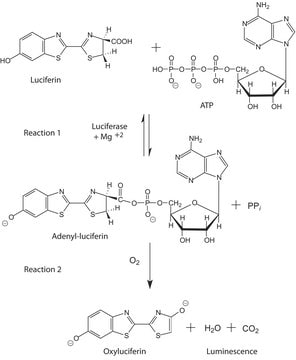MAK135
ADP/ATP Ratio Assay Kit
sufficient for 100 tests (bioluminescent)
Se connecterpour consulter vos tarifs contractuels et ceux de votre entreprise/organisme
About This Item
Code UNSPSC :
12161503
Nomenclature NACRES :
NA.84
Produits recommandés
Utilisation
sufficient for 100 tests (bioluminescent)
Application(s)
pharmaceutical
Méthode de détection
chemiluminescent
Maladie(s) pertinente(s)
cancer
Température de stockage
−20°C
Description générale
Changes in the ADP/ATP ratio have been used to differentiate modes of cell death and viability. Increased levels of ATP and decreased levels of ADP signify proliferating cells. Conversely, decreased levels of ATP and increased levels of ADP represent apoptotic or necrotic cells where the decrease in ATP and increase in ADP are much more pronounced in necrosis versus apoptosis.
Application
- LOC554202 contributes to chordoma progression by sponging miR-377-3p and up-regulating SMAD3.: This article investigates the molecular mechanisms by which LOC554202 facilitates chordoma progression through miR-377-3p and SMAD3 regulation. The ADP/ATP Ratio Assay Kit was utilized to assess the metabolic impact of these molecular changes on cell viability and proliferation (Xu et al., 2023).
- FOXG1 improves mitochondrial function and promotes the progression of nasopharyngeal carcinoma.: This study explores how FOXG1 enhances mitochondrial function, thereby promoting nasopharyngeal carcinoma progression. The ADP/ATP Ratio Assay Kit was employed to measure mitochondrial function and energy metabolism changes, providing insights into the bioenergetic profile of cancer cells (Xi et al., 2021).
Caractéristiques et avantages
Compatible with high-throughput handling systems.
Adéquation
Suitable for the detection of apoptosis and necrosis in cells and for the studying the effects of compounds on cellular proliferation.
Principe
The ADP/ATP Ratio Assay kit provides a simple and direct procedure for measuring ADP and ATP levels in cells for the screening of apoptosis, necrosis, and cell proliferation. The assay involves two steps. In the first step, the working reagent lyses cells to release ATP and ADP. In the presence of luciferase, ATP immediately reacts with the Substrate D-luciferin to produce light. The light intensity is a direct measure of the intracellular ATP concentration.
Luciferase
ATP + D-Luciferin + O2 ----------> oxyluciferin + AMP + PPi + CO2 + light
In the second step, the ADP is converted to ATP through an enzyme reaction. This newly formed ATP then reacts with the D-luciferin as in the first step. The second light intensity measured represents the total ADP and ATP concentration in the sample.
Luciferase
ATP + D-Luciferin + O2 ----------> oxyluciferin + AMP + PPi + CO2 + light
In the second step, the ADP is converted to ATP through an enzyme reaction. This newly formed ATP then reacts with the D-luciferin as in the first step. The second light intensity measured represents the total ADP and ATP concentration in the sample.
Produit(s) apparenté(s)
Réf. du produit
Description
Tarif
Mention d'avertissement
Warning
Mentions de danger
Conseils de prudence
Classification des risques
Aquatic Chronic 3 - Skin Sens. 1
Code de la classe de stockage
10 - Combustible liquids
Faites votre choix parmi les versions les plus récentes :
Certificats d'analyse (COA)
Lot/Batch Number
Vous ne trouvez pas la bonne version ?
Si vous avez besoin d'une version particulière, vous pouvez rechercher un certificat spécifique par le numéro de lot.
Déjà en possession de ce produit ?
Retrouvez la documentation relative aux produits que vous avez récemment achetés dans la Bibliothèque de documents.
King-Chuen Wu et al.
Journal of cellular biochemistry, 118(5), 1108-1117 (2016-09-09)
Cells switch to anaerobic glycolysis when there is a lack of oxygen during brain ischemia. Extracellular pH thus drops and such acidosis causes neuronal cell death. The fate of astrocytes, mechanical, and functional partners of neurons, in acidosis is less
Feilong Wang et al.
EBioMedicine, 30, 303-316 (2018-02-22)
Classical activation of M1 macrophages with lipopolysaccharide (LPS) is associated with a metabolic switch from oxidative phosphorylation to glycolysis. However, the generalizability of such metabolic remodeling to other modes of M1 macrophage stimulation, e.g. type II interferons (IFNs) such as
Aline G Cozer et al.
Lipids, 51(11), 1303-1307 (2016-10-25)
The present work assesses in vitro the role of human Stanniocalcin 1 (hSTC-1) in glucose metabolism in white retroperitoneal adipose tissue (WRAT) from fed rat. In the fed state, hSTC1 increases the incorporation of
Nidal Zeineh et al.
Cells, 8(7) (2019-07-13)
The 18 kDa translocator protein (TSPO) is an initiator of the mitochondrial apoptosis cascade. Cigarette smoke (CS) exposure provokes alterations in TSPO expression as well as upregulation of its related functions such as mitochondrial membrane potential (ΔψM) and reactive oxygen
Sangiliyandi Gurunathan et al.
Polymers, 11(4) (2019-04-26)
Metal nanoparticles and the combination of metal nanoparticles with graphene oxide are widely used in environmental, agriculture, textile, and therapeutic applications. The effect of graphene oxide-green platinum nanoparticles (GO-PtNPs) on human prostate cancer cells (LNCaP) is unclear. Therefore, this study
Notre équipe de scientifiques dispose d'une expérience dans tous les secteurs de la recherche, notamment en sciences de la vie, science des matériaux, synthèse chimique, chromatographie, analyse et dans de nombreux autres domaines..
Contacter notre Service technique





